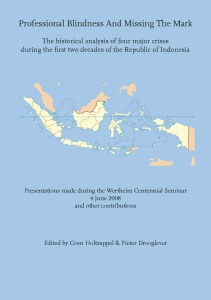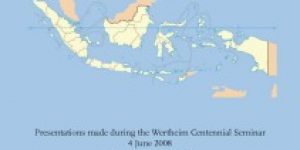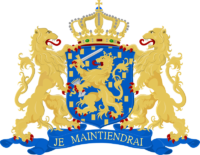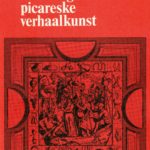Professional Blindness And Missing The Mark – Postscript
No comments yet In this book we presented six short studies on political crises that occurred during the first two decades of the existence of the Republic of Indonesia. The articles are mainly based on source material that until recently had escaped the attention or had only been analyzed selectively. In all these cases ignorance played a role, resulting either from lack of knowledge or unwillingness to take note of relevant information. From a wider range of possible options, four of the most important causal factors are discussed in the present volume.
In this book we presented six short studies on political crises that occurred during the first two decades of the existence of the Republic of Indonesia. The articles are mainly based on source material that until recently had escaped the attention or had only been analyzed selectively. In all these cases ignorance played a role, resulting either from lack of knowledge or unwillingness to take note of relevant information. From a wider range of possible options, four of the most important causal factors are discussed in the present volume.
The first factor (I) is formed by the policy of governments (and other owners of information) of closing their more sensitive archives and other sources of information for political reasons for a given period. Normally, a way out is offered by the handling of fixed terms and legal facilities such as the US Freedom of Information Act. The researcher may be able to speed up the opening up of the archives he wishes to see by calling on those kinds of acts. Some leeway may be created this way, depending upon the democratic disposition of the authorities in charge, or the sensitivity of the material. When this does not work, we come upon a second and more serious category (II), that is to say the world of secrecy, where the powers that be try to hide their involvement in morally or politically reproachable affairs in the past, or present them in a form more amenable to their actual interests. This brings us to the third category (III), made up of academics and the like that for reasons of opportunity or fixed convictions tend to look away when confronted with evidence that does not fit in with earlier hard won and widely accepted theories. These are found in all walks of academic life. Linked to this, but defined here as a fourth category (IV), are the sentiments of participants in past events, who tend to reject analyses that do not fit their personal memories. Often, journalists can be found in in this same group.
We derived the Ignorance concept from Wertheim’s last Master Course from 1972/1973, when he warned his master students against the neoliberalism that was entering social sciences at the time, by taking the individual as the starting point for the comparative study of society. Although the term neoliberalism has different meanings in different fields of research, Wertheim focused on the neoliberal fixation on the trading individual and its rejection of structuralism in the study of history. He dived into the history of the sociology of knowledge and made students aware of the arguments behind these constructions. He argued that they had been helpful in analyzing the historical roots of social inequality and oppression, and illustrated this with examples from ignorance cases from the history of the Netherlands Indies. In these articles we follow the trail a bit further into the first decades of Indonesian independence.
The early stages of the Indonesian revolution created a multitude of ideologically driven political and military groups, under the umbrella of a president who desperately tried his best to keep the fragments together and provide them with a view of the country in order to unite them under the flag of independence. At the time, Indonesia failed to create a centralized and institutionalized state system. Policy making was a matter of networking, trading and sharing power with activists that claimed imagined institutional positions, as well as manipulating information and managing rumors to mobilize followers and supporters for their aims. After 1950, the political, military and cultural fragments that survived the war against the Dutch continued to wage their own battles. They did so up to 1965 and after. The Cold War context was the framework in which these battles took place. It provided the groups with plenty opportunities to try to get foreign support for domestic action, either threatening the president’s position or supporting it. All crises studied in this book were domestic affairs indeed. Any links of revolutionary movement members to the outside world were of an opportunistic nature, united only by a drive towards independence. They all strived after some form of independence, but it was always one of their own making. The leaders of the 1948 Affair and the initiators from the GK30S had a decidedly different state in mind than the various Papuan concepts of Independence. So there was ample room for disagreement and internal rivalry. President Sukarno in particular excelled at changing partners for the sake of keeping upright the values of Revolution and Independence as he saw fit during the first twenty years of Indonesia’s existence.
Now let us take a look at the articles. To start with, we plainly asked the authors to discuss an event from the first decades of the Indonesian state, where the aspect of ‘ignorance’ or ‘blank spot’ might be relevant. This ‘free for all’ – approach worked out well. Ignorance showed up in different forms and in all four categories mentioned above. To begin with the research on the Indonesian camps for Indo-Europeans, founded by the Republic of Indonesia during the Bersiap period (1945-1946). For most of the inmates it had been a time of misery and separation from friends and family that bereft them for months and even years from a return to the normalcy they had hoped for after the end of the war with Japan. After their repatriation (or emigration) to The Netherlands, the memories to these camps were pushed away as much as possible. From 1969 on, when the Dutch archives were gradually opened up, these camps were studied seriously for the first time, however only summarily, and more often than not in the margin of the broader story of the demise of the Netherlands Indies. It led to rather negative judgments as to the physical and moral qualities of these camps, in line with the material consulted. They were described as internment camps, mainly set up by the Indonesian leaders to prevent the Indonesian youth from joining the Dutch army in their struggle against the Indonesian pemudas, and in order to use them and their parents as hostages in negotiations with the Dutch. This negative judgment rang a bell with many camp survivors living in The Netherlands, since it confirmed their bad memories. This remained the case until only recently, when the topic was picked up by Mary van Delden, resulting in a dissertation in 2009. Van Delden had more archival material at her disposal than her predecessors did for her study, complemented with a series of interviews with former inmates and a number of talks with Indonesians who had participated in running the camps. The result was a decided revision of the earlier views. Her overall impression was that these camps were created upon orders of the Republican leadership to protect people against the aggression of the young Indonesian revolutionaries and to demonstrate to the Allied command on Java that they were quite able to operate as a responsible government. Understandably, this more positive point of view annoyed former inmates while at the same time being satisfactory to surviving Indonesian freedom fighters. Apparently, the voices of the Indonesians involved, together with a more lenient judgment on the part of some of the former Dutch prisoners, had led the author to come up with this revisionist approach. However, it was also the result of a better reading of the available archives and documentary editions. Viewed from the vantage point of our study of ignorance, we can say that in this case most markers point towards the factors III and IV as the main causes of this reversal. The greater distance in time, as well as a willingness to listen to the other party, must have led to a more complete interpretation of material that has been available for a long time. Although this is probably not the last to be said on the subject, the new interpretation will definitely play a role in the future debate.
The phenomenon of historical blindness to information that has been available for a long time is apparent in all the other papers as well. We see the process at work in Coen Holtzappel’s article on the so-called 1948 coup, summarizing the analysis by General Nasution who played an important role in this event. During his retirement in the 1980s, Nasution wrote a well-documented study on the Indonesian war of independence, including the Madiun Affairs of 1948. Nasution’s analysis differs from existing ones in four ways. First, he called the 1948 event an insurrection and not a coup. It was a point of view that violated President Sukarno’s original coup condemnation and drew attention to the military roots and side of the Madiun Affairs. The coup accusation proclaimed at 19 September 1948 referred to a communist setup, when the communist party PKI actually had no part in the local seize power that was the Madiun Affair. Second, the movement from which it resulted was a combined military and political affair with definite military roots. Third, Nasution created a reconstruction of the prologue of the affair and its aftermath from a military as well as a political viewpoint. Fourth, Nasution showed that the president’s coup accusation was primarily a preventive measure. The communist party PKI had not proclaimed a coup d’état. Instead the president used the local seize power to put a stop to the escalating military and political efforts to pressure him into quitting negotiations with the Dutch and launching an all-out guerrilla war against the Dutch troops. The president did not give in and a few commanders of the 29th Brigade seized power in Madiun in September 1948. They called on the people to follow their protest. Sukarno’s coup accusation focused on the Communist Party PKI that tried to organize support of the military protest, but was not involved in the seize power.
There are many conceivable causes for the unfamiliarity in the West with Nasution’s reconstruction of the Madiun Affair. Most of them he mentioned himself. One of them certainly is that his original analysis is rather voluminous and was written in the Indonesian language and was never translated. It did not get much attention outside of Indonesia. Another reason might be that due to bad memories, left wing critics saw, and still see, Nasution as a communist hater, the man who crushed communist party PKI in 1948. There is just no way he could be impartial. According to Nasution himself, he followed the president’s orders to devise a plan of action against the protesting troops and the PKI, that subsequently was accorded by an emergency session of the cabinet and implemented by loyal troops, including Nasution’s Siliwangi Division. His analysis is well documented and touches on all aspects and groups that played a role in the prologue of the Madiun Affairs, in particular the ministry of defense, the regional army commands, the village militias and the PKI. Other factors might have contributed to his obscurity among left wingers, such as his Dutch education, his Sumatran decent, and his creation of the much-hated West Java based Siliwangi Division that won the president’s trust, whereas units from other regions remained in the background. In this article we mostly see Ignorance Mark II, III and IV: The Indonesian government that sticks to the official coup accusation, academic fixations and bad memories of surviving victims.
The Thirtieth September Movement (G30S) of 1965 discussed by Holtzappel offers another example of the docility of analysts regarding authoritative political judgments, but a much more complicated one. Holtzappel’s re-study points at three cases of ignorance. First, local commander General Suharto, who made his first grab for power on the same day the G30S began, 1 October 1965, styled the movement as a communist coup right from the start. His example was followed by most Western analysts up to the present day, even when they had doubts about the tenability of the accusation. The accusation was a major political fact in itself. Second, by taking that stand, they refused to take note of the defense evidence provided by the leader of the movement – palace guard commander Untung – as well as CC PKI Politbiro member Njono who supported the movement from the outside with civil auxiliary units. Their evidence, contained in their recall of their initial and enforced coup confessions, showed that the G30S had support from authorities and government agencies that belonged to the president’s entourage. The movement opted for an action against the suspected Council of Generals that planned a coup. Even General Suharto played a role in it, since he helped Untung collect reliable elite troops for the G30S. Third, PKI leader hacked Untung’s action to rebuild it in a broad military-political front against the Council of Generals called the Thirtieth September Movement G30S. The plan for the operation focused on a suspicious army doctrine called Tri Ubaja Sakti (TUS, Three Holy Promises) accorded by the president earlier in 1965. According to PKI leader Aidit, in some aspects it threatened the implementation of the state and political reform accorded in the Bogor Declaration of December 1964. The ignorance history in this case showed several stages. General Suharto discredited the recalls of Untung and Njono’s earlier coup confessions, by calling them perjury and lies. Western analyses still balance between Suharto’s coup accusation and the recalls of the two suspects that are still doubted by Western analysts and communists. Ignorance types III and IV apply to this case.
Drooglever shows in his article that Papua history offers a fourth instance of ignorance, a result of the limited interest among researchers for the meaning of Papua nationalism. For a long time it was mainly regarded as a plaything of Dutch foreign minister Joseph Luns, only accepted as a living force years later, after the downfall of president Suharto. Here as well the reasons for that ignorance are manifold. For long, the fixed focus of academics and much of the reading public was on the struggle for independence of the Indonesian state at large, and the idea of conflicting notions of statehood ran counter to the concepts of the Indonesian authorities as well as most foreign academics. The former effectively closed off the territory and its related archives to academic researchers, and the latter hardly protested. The ongoing unrest in West New Guinea, if noted at all, was easily cast aside as the result of ill-advised Dutch policies. So, Papua life became a hidden factor as soon as the first Indonesian troops and administrators entered the picture in October 1962, and still today it is a tricky endeavor for a student to enter the field and cope with the wrath of the Indonesian authorities. Here, a mixture of intimidation, fixed research agendas and opportunism combine to isolate the Papua world. From 1962 onwards, factor II must be regarded as the main explanation for the ignorance, but never alone. The forces of opportunism (III) are always present.
A fifth instance of ignorance could be brought forward in the study of the 1965-1966 massacres. Up to now, interest in the ordeal has been rather meager. Moreover, students of the episode have ignored or denied the atrocities against members of the communist women organization Gerwani in a specific gender aspect of the mass murders. They also ignored how the Suharto regime subsequently legitimized its existence by the imagery on the national monument for the murdered generals. At that prominent place, Gerwani women are imagined as an uncivilized wild creature not worthy of existence, whereas the docile Javanese housewife is shown to be the proper pillar of the Suharto regime. A clear case of Ignorance Marks II and III.
Our last case of ignorance regards the misunderstanding of a renowned American cultural anthropologist who refused to instantly condemn the Bali massacres of 1966 as immoral until he had found what triggered the murders according to his informants. His final conclusion matches the findings from the revisit of the G30S. Yet, the researcher’s initial reluctance to condemn the massacres as immoral perplexed colleagues who expected a fast moral condemnation. It can of course be argued that it is the task of historians and other social scientists to sharply divide proper factual analysis from moral condemnation. They represent two different paths of action that should not be mixed up. That being said, we may still feel entitled to discern the forces of Ignorance Mark III at work in this case.
So far our six cases. From this hasty survey we may deduce that in nearly all of them the element of Ignorance played a deciding part, and that its prevalence can be attributed to a combination of factors. It should be stated that it is not an easy task defining which was more important in each given case. Human life, and therefore human history, is a complicated matter, and difficult to compress in fixed schedules. Moreover, our schedule is far from complete, and when all relevant factors are taken into account the result will become unmanageable, and nevertheless incomplete in the end. Time and context are just as important as factual information, and interpretation by the human mind will always be necessary to keep our work within the borders of academic decency.
So we may allow some credit to the traditional preference (be it neoliberal or not) for ‘facts’ and the role of the individual, and accept a limit to the drive for structural ambitions. However, good history writing is impossible without a critical mind and systematic thinking, and that is certainly a lesson Wim Wertheim wanted his students to learn.
You May Also Like
Comments
Leave a Reply




